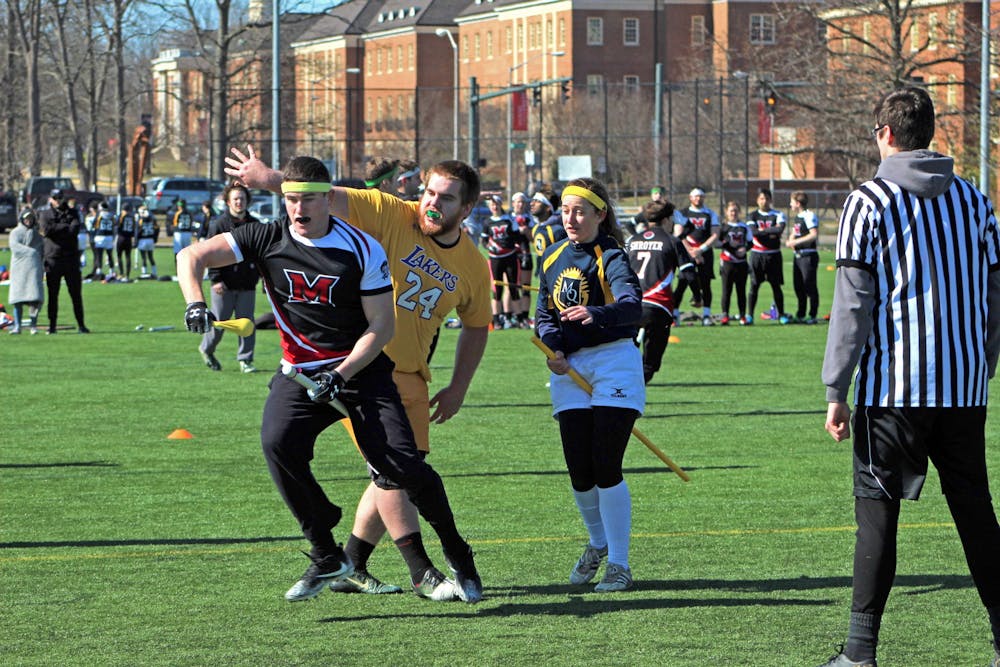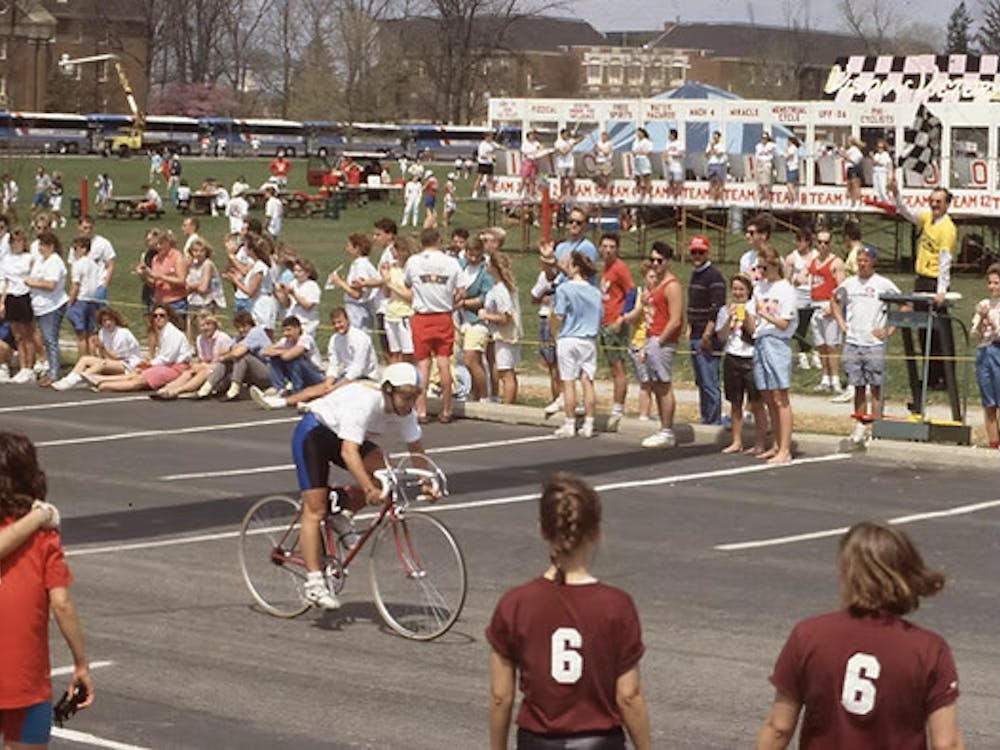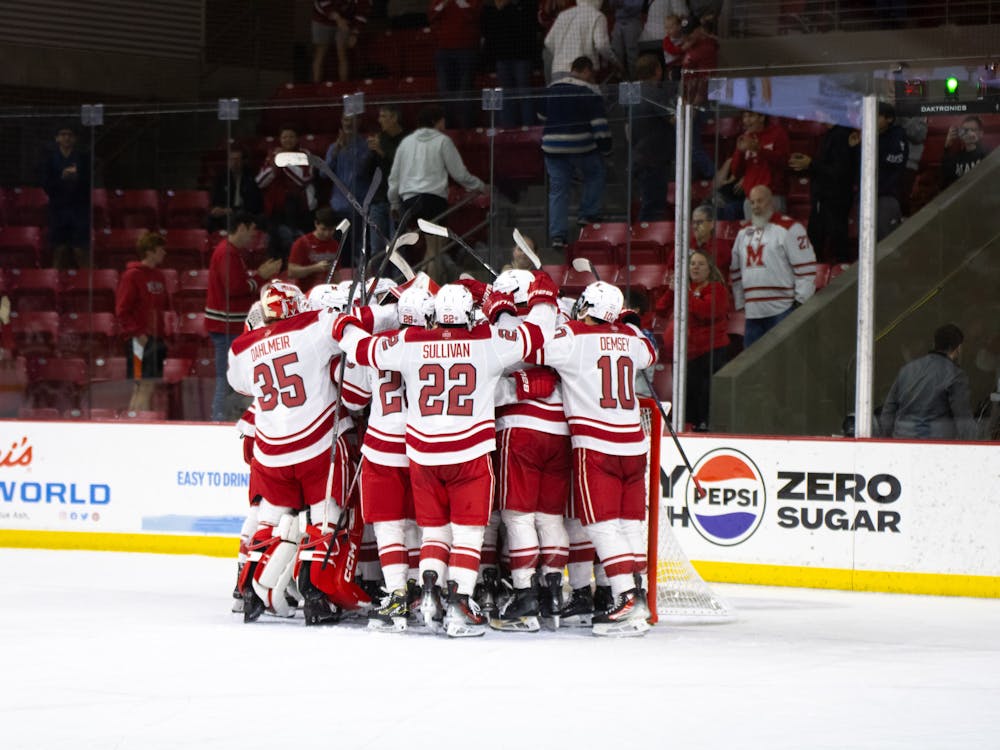Quidditch, the competitive sport famously recognized in Harry Potter, has leapt straight from the pages and is taking the Muggle world by storm. According to US Quadball, the sport’s formal name, there are roughly 56 official collegiate teams across the country as of the 2023-2024 season, one of which is right here on Miami University’s campus.
Founded in 2009, quidditch officially became one of the many club teams available at Miami. In prior years, the team has held strong numbers of involvement, but following the pandemic it has struggled to recruit more players and still has not recovered. Junior Preston Sanders, the club president, leads the team this year alongside sophomore head coach, Evan Moody.
“[Recruitment] is one thing we have been struggling with this year … In years past, we have had … about 30 people pre-COVID,” Sanders said. “… We very much shrunk down now and this is about all we’ve got, really.”
The lack of players has made it difficult for the team to keep up with such a complex sport.
The rules of the game
Quidditch is a co-ed sport that combines components of rugby, soccer and dodgeball. The sport is broken down into four positions: keeper, chaser, beater and seeker.
The keeper is the player in goal. There’s a set of three hoops on each side of the field, and it’s the keeper’s job to protect the opposing team from scoring.
The chasers try to score. They use “quaffles” (volleyballs) to shoot through any of the three hoops, to score 10 points.
The beaters are the defense of the field. They protect their teammates while also clearing out opponents with a dodgeball or “bludger.” When a player is hit with a bludger, they become out of play and need to tag up on their team’s middle hoop to re-enter the game.
Finally, seekers are those who chase the “snitch.” The snitch and the seekers enter the game after the 20-minute mark of play. The snitch is worth 35 points.
Each team has six players on the field until the snitch is released. For a team to win, it must be the first one to reach the set score, introduced at the 20-minute mark and established by “adding” 70 points to the score of the leading team by that mark.
The biggest difference between the book and collegiate quidditch is the broomsticks. Due to the lack of magic brooms, these players settle to ride on Miami-logoed PVC pipes instead.
Enjoy what you're reading?
Signup for our newsletter
Another major difference is the snitch. In the book, this is a small, golden, flying ball, but here, the snitch is represented by an extra player who runs the field with yellow shorts on. A ball is attached to the back of these shorts, which needs to be taken off and disconnected to be awarded points. Once the snitch is caught, both the snitch and the seekers exit the game.
Every year, Miami’s team plays anywhere between three and five tournaments, including regionals and nationals. At these tournaments, roughly 10 teams attend, three of which Miami ends up playing.
‘Low interest’: The struggles to return after COVID
The biggest challenge Miami’s team faces is recruiting, which has hindered its availability to play in these tournaments. After the pandemic, interest in the sport has dipped.
Currently, there are roughly 10 players on the roster.
At practice, it’s apparent how the lack of interest made it difficult to run an effective practice. Only a handful of players attended and the energy was low. The players who did show up played catch and there were no plays or drills being run.
Not only is it challenging for Sanders to recruit players, but it is challenging to recruit players who are actually committed to showing up. Last year the team missed out on hosting its own tournament on Cook Field because of “low interest.”
Mega Fair continues to be the largest recruiting opportunity for the team, but lack of knowledge and misjudgment tend to turn people away.
“Numbers are a big challenge because everyone hears that it is a Harry Potter sport, and they don’t quite give it as much of a thought,” Sanders said. “I was one of those people originally as I showed up.”
Sanders was not the only one who felt some early hesitation before joining. Moody had never played quidditch before coming to Miami and has endured the feelings that others may experience when trying something new.
“For most people, I know for me, it was really daunting, like, ‘Oh my gosh, this is a whole new sport that I’ve never heard of before,’” Moody said. “And so we are trying to open people up to the idea of, like, it’s OK if you don’t know.”
Both of them are grateful they put their uncertainty aside and took that initial leap. After joining the team, they were able to make lasting friendships and memories throughout the years.
“It really is the most welcoming community and one of the most welcoming communities that I’ve ever been a part of because a lot of people hear ‘club sport’ and get really intimidated,” Moody said. “And it just doesn’t need to be like that.”
The quidditch team is an opportunity to get involved on campus, meet new people, and possibly take home a national championship. The team’s first tournament of the year will be at the University of Illinois Urbana-Champaign on Nov. 18.




